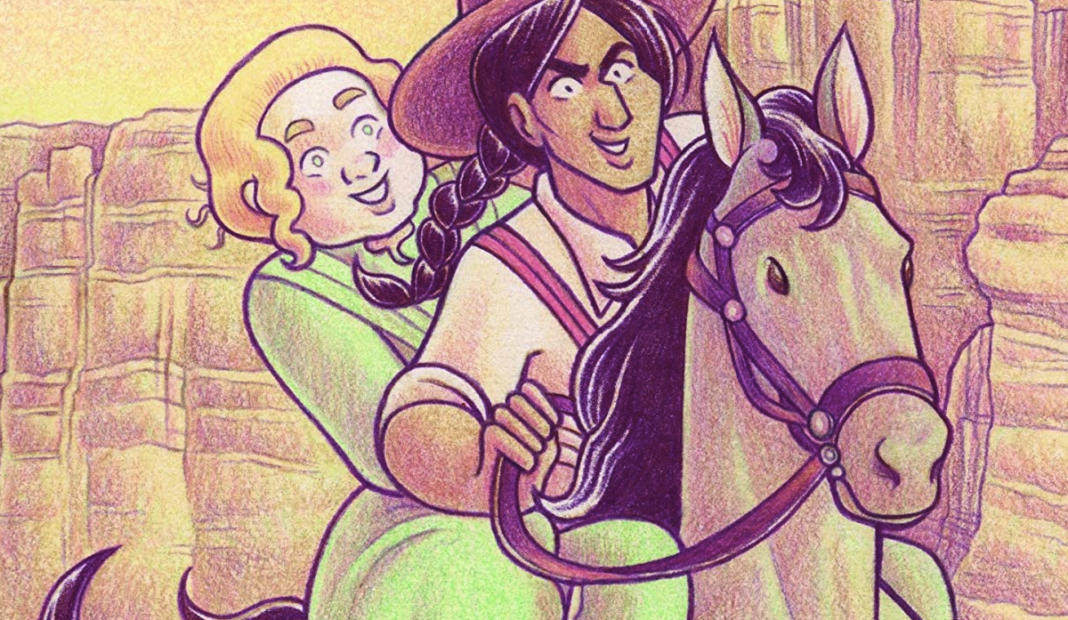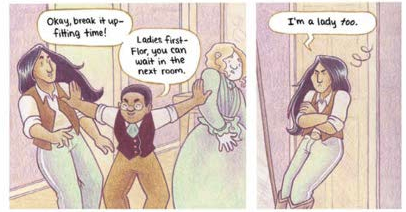Welcome to Queerness In Comics, a bi-weekly column by Avery Kaplan, which will explore queer representation in comics. This week, Avery is exploring Stage Dreams, released in 2019.

Publisher: Lerner Books
Stage Dreams by Melanie Gillman is a window into the lost queer history of the Old West. As queer people, we have and always will be a part of history. However, because of the longstanding prejudice and systemic mechanisms aligned against us, much of our history has been concealed or erased. Stage Dreams aims to counteract these forces by telling a beautifully rendered Western romance story with queer representation, and the outcome isn’t just important as an exercise in paying respects to our queer progenitors: it’s also a whole lot of fun!
Stage Dreams
The story begins in 1861 as a mysterious woman boards a stagecoach in the New Mexico Territory, her bonnet pulled down to conceal her identity. While some of the passengers remark on her strange behavior, their suspicions never get a chance to go anywhere, as they soon find themselves besieged by the notorious bandit Ghost Hawk.
When Ghost Hawk finds the monetary reserves of the stagecoach to be somewhat lacking, she instead resolves to kidnap the woman in the bonnet and hold her ransom. However, once Ghost Hawk ties the woman to a tree, she discovers that the woman – Grace – is transgender. Faced with the prospect of conscription into the Confederate Army, Grace resolved to flee her home in Georgia in the hopes of making a new life for herself on the stage in San Francisco.
Ghost Hawk (whose name is Flor) is sympathetic to Grace’s plight, even when it turns out that her plan to ransom the Southern Belle will be frustrated by the fact that Grace’s family, who doesn’t know she is trans, is unlikely to pony up the cash.
Grace learns that Flor is planning a heist involving a Confederate Gala and insists that she be allowed to join in the operation, pointing out that her experience and knowledge of Southern tradition means that posing as a debutant with ties to one of the men at the gala is the perfect cover story.
In addition to the blow to the Confederate agenda that the pair deals over the course of their adventure, Grace and Flor also have a very sweet queer romance that unfolds as the story progresses. While it comes as no surprise when the story ends in the pair coupling, it’s very rewarding to see the pair literally riding off in the sunset together, and it’s hard not to imagine the many adventures they fall into after this tale has been told.
The Lost History of the Queer Old West
In a post on the Lerner Books Blog, Gillman described the process they followed to research queer history during this time period. One of the challenges they faced was one of language: at this point in our history, many of the words we use to identify ourselves today either were not widely used or simply did not exist (on the blog, Gillman specifically notes that searching for the word “transgender” in historical newspaper archives is a futile effort).
However, while the language for the people many not yet have existed, the people still did. The narrative of Stage Dreams demonstrates this: at no point in the text does Grace identify herself as transgender, and yet, the story and the artwork reveal that this is the case. The fact that the language itself is not used does not detract from the fact that these are unquestionably queer characters leading queer lives, just as the lack of available language in history does not make our queer progenitors any less queer.
Another challenge Gillman discussed was the irony that for many of the trans historical figures we are aware of, we are only aware of them because their personal wishes were disrespected upon their death (and, unfortunately, frequently leading to newspaper headlines that painfully misgendered the deceased). While it is important to acknowledge and explore queer history, outing someone against their wishes after they’ve died can be hard to stomach no matter how long they’ve been dead.
Fortunately, historical fiction like Stage Dreams affords the opportunity to explore these narratives without having to out any historical figures. While Grace and Flor themselves may not have existed, stories resembling theirs certainly did, and thanks to the historical details included in the text by Gillman, it’s easy to imagine what the lives of real queer people living during the time period might have looked like. The back pages of the comic include endnotes on specific details in the text, affording even deeper insight into the historical context of the story.
(For an antidote to the “posthumously outed against their wishes” story, check out the comic “Dead Name No More” in the Theater of Terror!: Revenge of the Queers collection. The short story follows transgender ghost hunter Lorelei Fontaine, who helps trans ghosts forced to stay in the closet during life to live their truest afterlives.)
Riding into the colored-pencil sunset
The Stage Dreams dedication reads: “To our queer and trans ancestors. Far too many of your stories were lost, but we remember you.” The dedication isn’t just paying homage to those who came before; it’s also a call to action. Remembering and preserving queer history isn’t a passive activity, but rather, it’s an endeavor that requires active effort, persistence, and perseverance – all of which are evident in every pencil colored panel of Stage Dreams.










